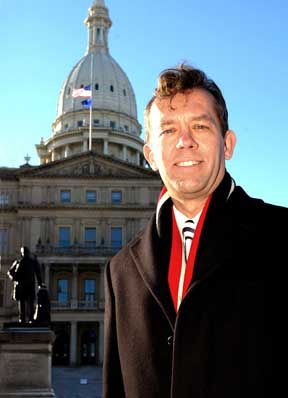
 One Man's Mission: Representing God in Two Different Worlds
One Man's Mission: Representing God in Two Different Worlds
Rick Shaffer—Michigan House Representative and 13-time Teen Mission Impact participant
(from the April 2003 issue)
by Michael Nickless
Why are short-term mission projects so popular with Adventists? We know that these mission projects continue to impact lives long after the events end, but what motivates people to go in the first place, and why do they continue to go?

Rick Shaffer, R.N., Centreville (Mich.) Church member, and Michigan House Representative, is active in both his church and community. Shaffer has gone on 13 Pathfinder Teen Mission trips to the Dominican Republic as a medical staff member. This official photograph of Rick Shaffer was taken in front of the Michigan Capitol in Lansing.
Rick Shaffer is a registered nurse and was recently elected as the 59th District Representative to the Michigan House of Representatives. An active member of the Centreville (Michigan) Church, he has taken part in 13 Pathfinder Teen Mission Impact trips to the Dominican Republic as a medical staff member.
According to Terry Dodge, Michigan Conference Pathfinder director, this program gives Pathfinders, 14 years and older, the chance to observe and assist health professionals in the treatment of people with medical, dental, and optical needs in a Third World cultural setting.
In an endeavor to understand why people go again and again, the Michigan conference communication staff interviewed Representative Shaffer. Here are portions of that interview.
Michigan Conference (MC): When did you first go on a Teen Mission project?
Rick Shaffer (RS): It was 1981.MC: I understand that you have gone 13 times, and that your son, Robbie, went with you this past Christmas as one of the teen volunteers. Is that correct?
RS: I started going during those early years with Merrill Fleming, former Michigan Conference Pathfinder director, and really loved being a part of Teen Mission. I see this as a double ministry. You not only minister to people’s medical needs, but probably the greatest ministry is the influence that you are able to have on your own young people.
MC: Why did you go your first time?
RS: You are probably going to laugh at this. My mother tells the story about reading all the various missionary books to me as a youngster. She spent a great deal of time trying to instill a desire for medical missionary work in me. During those early years of indoctrination, I never had an opportunity to do mission service as many of our kids do now. When Merrill invited me to come as a registered nurse, it just seemed like a great thing to try. And I kind of got it in my blood beyond that.
MC: Do you share your faith and what you do in mission work with others?

The Michigan conference communication staff interviewed Representative Rick Shaffer about his involvement in short-term mission projects.

Representative Shaffer (right) watched by son Robbie (center), hands a young mother medicine for her child during a clinic session in the Dominican Republic.
RS: Our hospital administrator was so enthused about the concept of Teen Mission that he came to my office and said, “Share with me more about Teen Mission.” So we talked 20 minutes, and he said, “I want to go.” I said, “What do you mean you want to go?” “Sign me up. I want to go on Teen Mission,” he said. The last two years he has gone with us, and this year he brought his son with him.
MC: I understand that you are actively involved in your local church. What church offices have you held?
RS: You know, when you go to a small church, you end up holding most of the offices at one time or another. I’ve been a Sabbath school superintendent and teacher, youth department director, and had the junior and early teen classes. But the most important position in the church, next to the pastor, is the Pathfinder director. That is such an important ministry. A host of different programming comes under the umbrella of the Pathfinder director, so that’s probably where my heart lies of all the various positions.
MC: Do you have any other examples of sharing your faith?
RS: This summer on the campaign trail, I was going door to door, meeting people face to face, sharing what my principles are. I met this one gentleman who quickly looked at my brochure and said, “Oh, I see you belong to the Seventh-day Adventist Church in Centreville.” Right in my campaign brochure I was not hesitant about who I am. He said, “My mother’s an Adventist, and she is going to be visiting in a few weeks. Would you mind if we came to your church?” And they did! They came as a direct result of that campaign brochure.
MC: Why did you run for a public office?
RS: I have been very active in my southwest Michigan community for 20 to 25 years. My strong health-care background brought out a desire to be of service to my community. From that desire to be of service, I became involved in various committees. The desire to go into state legislative government just kind of evolved through the process.
MC: I know you have been here only a short time, but do you ever feel like Daniel?
RS: Yes, I do! As a Christian, you are rubbing shoulders or you are involved every day with secular influences, everything from lobbyists to issues that certainly may not fit with our lifestyles or our goals. And so there are times that you feel that as a Christian, you are somewhat out on a limb. But it is amazing how many individuals, even among the other legislators, hold good solid Christian ideals. We try to network with those individuals.
MC: Is it difficult being a Seventh-day Adventist in the public eye?
RS: I’ve always made it a point to wear my Christianity on the outside so people are well aware that I am proud to be a Seventh-day Adventist. We have a wonderful worldwide network, from education to health care, and we should be very proud. We shouldn’t ever be ashamed to be a witness to those that we come in contact with. Keeping the Sabbath hasn’t really been a problem. Our sessions only meet Tuesday, Wednesday, and Thursday, so it would be a rarity that Sabbath sessions should ever occur.MC: Do you have opportunities to witness in this new job?
RS: Well, yes, that comes about as we live and work in a secular world. As far as the entertainment aspect of it, you go to lunches, you go to buffets, and obviously there are a variety of meats and beverages, and people will say, “I noticed you did this, but you didn’t do that,” and it is a great opportunity for sharing. Often times you will find people that will say, “Oh yeah, I have a Seventh-day Adventist in my town at such and such a place,” and you strike up a great conversation. Or, they will say, “There is a church that I go by every day; tell me a little about Seventh-day Adventists.”MC: What message do you want to get across to the youth out there?
RS: I think the first message I want to give to every youth is that all jobs are important. We are all on an individual heavenly pathway. And just like the parable in the Bible, we’ve been entrusted with different talents that God expects us to use for His glory. I would say to young people that I urge them to stay attuned to the call of God’s voice, and to follow into whatever occupation He may lead. You, too, can be an effective witness to others within your community by rendering that service to Him.
Short-term mission projects are anything but short term in their impact on people. Rick Shaffer will continue to live as a missionary, not just when he accompanies the teens, but in his everyday life. I believe that is what Jesus wants all of us to do.
What is the Herald?
| Herald online | Label Updates
| Submit information
| Advertise |
Info in past issues | Contact us
LUC Main Menu | About Us | Conferences | Departments | Feedback | Links
Copyright © 1999 by Lake Union Conference
of Seventh-day Adventists.
Website hosting, maintenance and ecommerce by Hosford
Web Service
